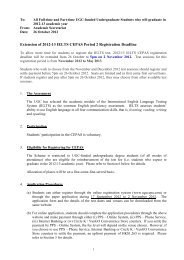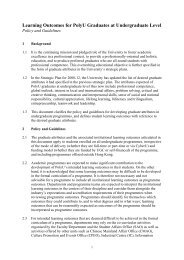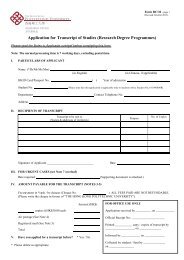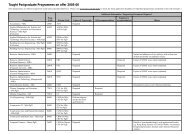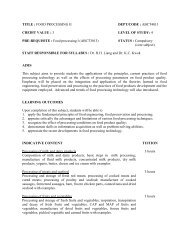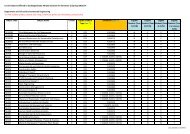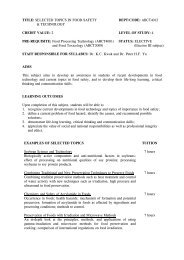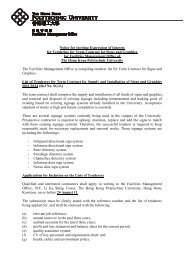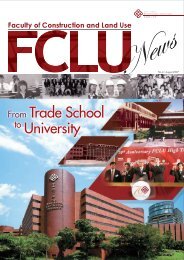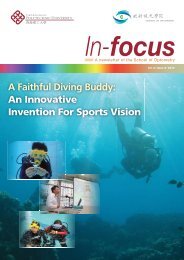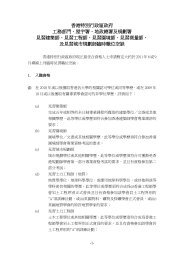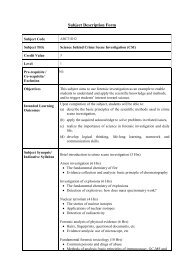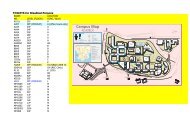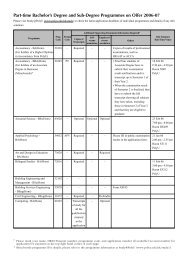ABCT1D01
ABCT1D01
ABCT1D01
You also want an ePaper? Increase the reach of your titles
YUMPU automatically turns print PDFs into web optimized ePapers that Google loves.
Subject Description Form<br />
Subject Code<br />
Subject Title<br />
<strong>ABCT1D01</strong>/ABCT1301<br />
Chemistry and Modern Living<br />
Credit Value 3<br />
Level 1<br />
Pre-requisite /<br />
Co-requisite/<br />
Exclusion<br />
Objectives<br />
Intended Learning<br />
Outcomes<br />
No pre-requisite<br />
This subject aims to provide opportunities for students to develop and<br />
use chemical concepts and skills, so that the students would understand<br />
the chemistry behind some issues and problems that may arise within the<br />
community.<br />
Upon completion of the subject, students will be able to:<br />
(a) realize the importance of chemical science and technology in our<br />
everyday life<br />
(b)<br />
(c)<br />
appreciate the benefits and shortfalls of technology<br />
analyze critically current issues in modern technology, including issues<br />
in environment, renewable energy, new materials etc..<br />
Please explain how the stated learning outcomes relate to the following three<br />
essential features of GUR subjects: Literacy, Higher order thinking, and Skills<br />
for life-long learning<br />
Literacy: The students are required to read some assigned materials (e.g.<br />
news articles, general science literature) before the lectures as a<br />
preparation of the lecture topics. A few questions will be raised for each<br />
reading materials to help the students to think about the context before<br />
the lectures. [Outcomes (a), (b), and (c)]<br />
Higher order thinking: This subject is a broad introduction to Chemistry<br />
as a way of thinking and knowing. This subject will present key chemical<br />
principles on need-to-know basis within a context of modern living. The<br />
students will develop these concepts and principles in the lectures,<br />
tutorials and laboratory classes. A student completing this subject ought<br />
to be empowered by the way of thinking rationally and make judgment<br />
based on evidence; and be able to apply it throughout life. [Outcomes (a)<br />
(b) and (c)]<br />
Life-long learning: Making rational judgment will be an emphasis of this<br />
course and students are expected to keep a journal with entries stimulated<br />
by the questions after the lectures. Some of the questions will be directed<br />
to reflection on whether systematic observations, scientific reasoning and<br />
rational judgment are being applied in their own decision making<br />
processes in scenarios related to their academic study, career<br />
development and personal issues. Students are required to organize into<br />
groups to prepare a presentation on selected topics with individual report.<br />
Literature survey techniques will be introduced to help students identify<br />
7.2009 Definitive Programme Document and Programme File C4 - 1
information and access the credibility of the text based on whether the<br />
evidence are supported by experimental data. [Outcomes (a), (b) and (c)]<br />
Subject Synopsis/<br />
Indicative Syllabus<br />
Teaching/Learning<br />
Methodology<br />
Topics<br />
Contact Hours<br />
The nature of matter – elements, compounds and<br />
4<br />
mixtures; atoms and molecules<br />
Traditional materials – metals, glass and porcelain 4<br />
Modern materials – semi-conductor, plastics and nan 6<br />
o-<br />
materials<br />
Acid rain, ozone hole and global warming 4<br />
Renewable energy 4<br />
DDT and persistent pollutants 2<br />
Waste treatment and recycling 2<br />
Water treatment and recycling 2<br />
Major and minor components of food 4<br />
Changes of food upon cooking 4<br />
Mayonnaise, detergent and emulsion 2<br />
Acid, base and colour of food 4<br />
Lectures: This is the major teaching method used in this subject. A few<br />
questions will be asked for each reading materials to help the students think<br />
about the context before the lectures.<br />
Tutorials: Tutorials will be a venue to engage students in active learning<br />
processes through discussing of some chemistry-related issues reported in<br />
the newspapers. Students formed groups of four to six students to discuss<br />
and express their opinions on some specific questions by invoking the<br />
principles and concepts learnt from earlier classes. It is aimed to develop the<br />
problem-solving skills of the students with real-world problems. In later<br />
stage, each group will be assigned a topic for literature survey and<br />
presentation in the tutorial.<br />
Laboratory: Chemistry is an experimental science and it is the best way to<br />
know the subject. Selected simple and interesting experiments will be<br />
conducted by students in groups of two to three. The laboratory allows<br />
students to have experiences on collecting data and think about the<br />
reliability, accuracy and discuss how to make conclusion from the data. The<br />
students are required to submit simple reports as a way to record their<br />
observation systematically. This set a good example on making rational<br />
decisions based on observations and evidences.<br />
Individual Study: Students will be expected to spend two to three hours<br />
on reading outside the classroom. Questions will be given to prepare the<br />
students on the issues discussed. Since this may be an area of weakness<br />
for Hong Kong students, clear guidelines and checks will be in place to<br />
ensure that it occurs. Students are required to keep the answers of the<br />
questions in a reflective journal which will be collected a few times and<br />
7.2009 Definitive Programme Document and Programme File C4 - 2
marked. The emphasis in this subject on reading comprehension is<br />
designed to give the student an essential experience of empowerment in<br />
learning to study effectively.<br />
Assessment<br />
Methods in<br />
Alignment with<br />
Intended Learning<br />
Outcomes<br />
Specific assessment<br />
methods/tasks<br />
%<br />
weighting<br />
Intended subject learning outcomes to<br />
be assessed (Please tick as<br />
appropriate)<br />
a b c<br />
1. Quiz 40% <br />
2. Laboratory<br />
work<br />
3. Group<br />
presentation<br />
20% <br />
40% <br />
Total 100 %<br />
Student Study<br />
Effort Required<br />
Class contact:<br />
• Lecture 25 Hrs.<br />
• Tutorial 12 Hrs.<br />
• Laboratory 9 Hrs.<br />
Other student study effort:<br />
• Self study 45-70 Hrs.<br />
• Preparing presentation and literature report 16Hrs.<br />
Total student study effort<br />
107-132 Hrs.<br />
Reading List and<br />
References<br />
1. Lecture notes and supplementary materials (for some special<br />
topics) will be given.<br />
2. A website where students would find some general information<br />
on the relevance of chemistry to modern living are available:<br />
http://www.chemistryquestion.com/<br />
3. Chemistry in Context, Applying Chemistry to Society; 5 th edition<br />
(A Project by American Chemical Society) Lucy Pryde Eubanks,<br />
Cathy Middlecamp, Norbert J. Pienta, Carl E. Heltzel, Gabriela<br />
C.Weaver, MCGraw Hill, ISBN 0-07-282835-8<br />
4. On Food and Cooking The Science and Lore of the Kitchen,<br />
Revised Edition 2004, Harold McGee, Scribner, ISBN 0-684-<br />
80001-2<br />
7.2009 Definitive Programme Document and Programme File C4 - 3



